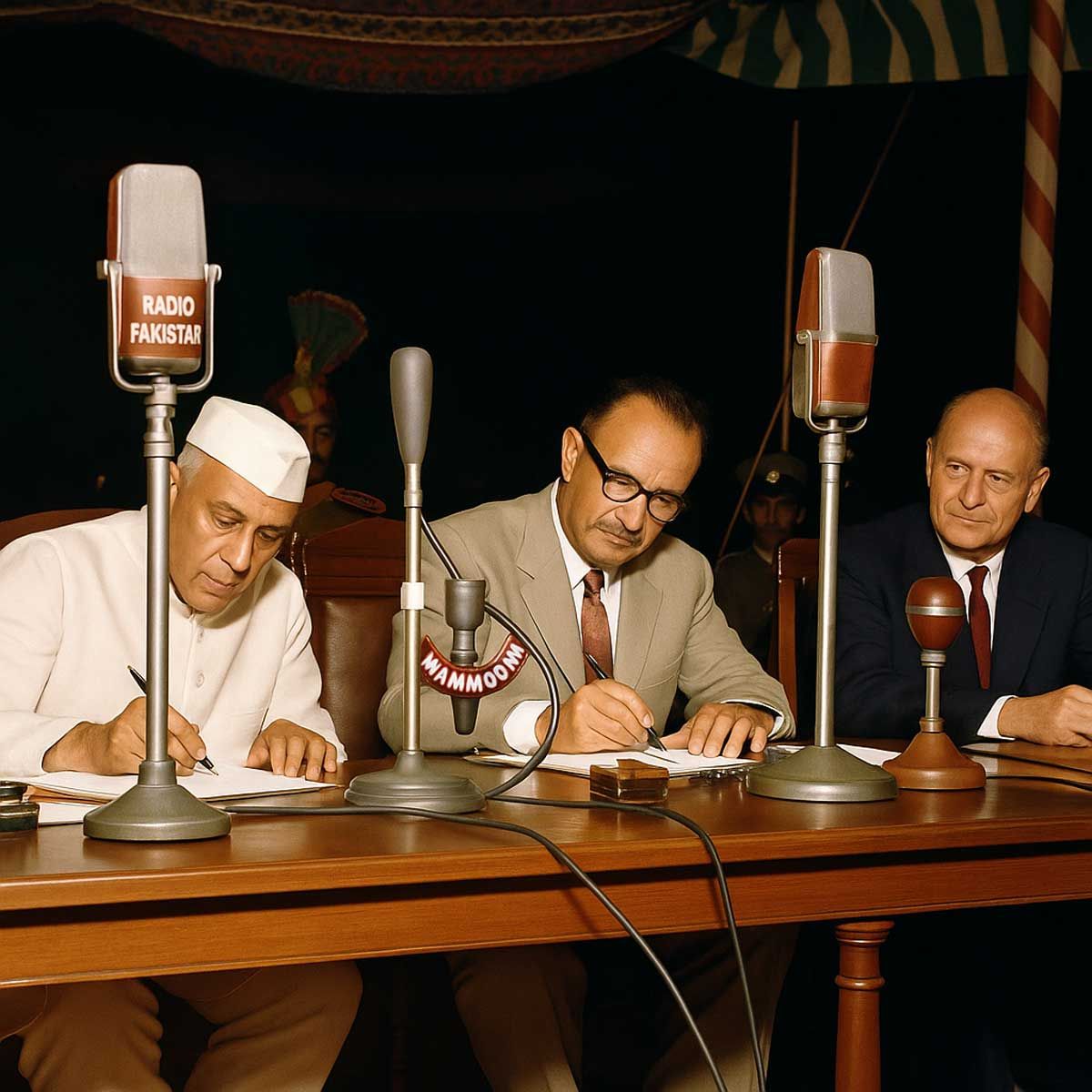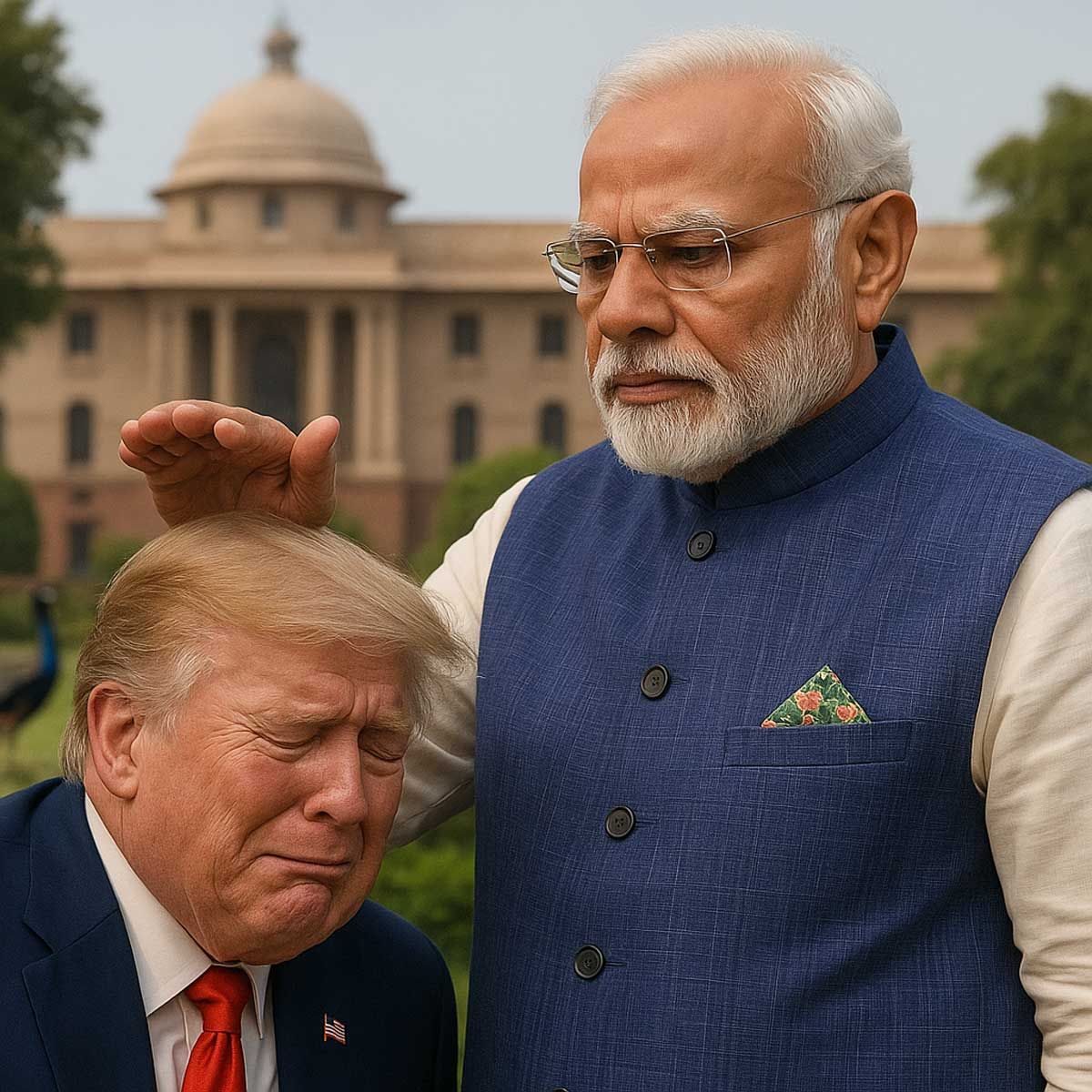Sanatan Articles
Satyaagrah
Written on
Satyaagrah
Written on
Satyaagrah
Written on
Satyaagrah
Written on
Satyaagrah
Written on
JOIN SATYAAGRAH SOCIAL MEDIA
In 1960, Nehru signed away 80% of India’s rivers to Pakistan without Parliament’s approval, dismissing outrage as “pailful of water,” a shocking blunder that crippled farmers for decades until Modi ripped apart this betrayal after relentless terror

Independent India’s first Prime Minister, Jawaharlal Nehru, is often remembered not only for his leadership but also for the many blunders committed during his long tenure. These decisions, even decades later, continue to cast a shadow on India’s progress and security. Among them, one of the most debated mistakes was the signing of the Indus Waters Treaty (IWT) in 1960, a treaty that surrendered India’s control over its own precious rivers.
|
Prime Minister Narendra Modi, in his Independence Day speech from the Red Fort, summed up the core problem of this agreement when he described the Indus Waters Treaty as “unjust and one-sided” because it inflicted monumental harm on Indian farmers while benefitting Pakistan. The tragedy of this decision became clearer when, just five years later, Pakistan launched a war against India in 1965, only to be defeated. Despite this aggression, the treaty remained in force, continuing to provide water benefits to Pakistan.
The issue was not merely about unfair terms. Nehru’s decision to accept and sign the treaty went against the will of India and its elected Parliament. The signing ceremony took place in Karachi on 19 September 1960, but when the matter was finally placed before the Indian Parliament on 30 November 1960, most MPs, including many from Nehru’s own Congress party, opposed it. Their objection was clear—the provisions tilted heavily in Pakistan’s favour, compromising India’s water security.
The seriousness of the issue demanded thorough scrutiny, yet the parliamentary debate was reduced to just two hours. For a treaty that determined the fate of India’s rivers, farmers, and food security, a mere two hours of discussion was allocated. Nehru had not even bothered to take Parliament or opposition leaders into confidence before signing away India’s water rights. Critics later compared this act to a “second partition”, arguing that India had voluntarily surrendered something as vital as water resources without ensuring safeguards for its people.
At the time, young MP Atal Bihari Vajpayee delivered one of his most powerful critiques of Nehru’s decision. Representing Balrampur in Uttar Pradesh, Vajpayee strongly condemned the treaty, calling it a dangerous concession to Pakistan. He reminded Parliament that the government had earlier promised to cut off Pakistan’s water supply by 1962, yet the treaty handed over permanent rights instead. Vajpayee’s words were sharp and unforgettable when he said: “This treaty is wrong, or that announcement was wrong.”
He also cited Pakistan’s President Ayub Khan, who boasted that India had agreed to share river control. Vajpayee warned of the grave implications of such an agreement, cautioning: “Joint control comprehends joint possession. When such agreements are made, Parliament is not taken into confidence.” His criticism highlighted the secrecy and lack of accountability in Nehru’s approach.
|
The discontent was not limited to Vajpayee alone. Harish Chandra Mathur, the MP from Pali in Rajasthan, also launched a scathing attack on the agreement. He described the treaty as “all to the disadvantage of this country”, adding that “…unfortunately, the facts of the case as they are before us give us an inevitable feeling that this treaty is all to the disadvantage of this country. It is all to the advantage of Pakistan.”
Mathur did not stop there. He pointed out how deeply his own state of Rajasthan would suffer. He noted that the loss of water would cost Rajasthan dearly—an estimated Rs. 70–80 crore every year due to the diversion of nearly five million acre-feet of water. In his words, “There is another point where we are severely affected. Through the treaty we are losing 5 million acre-feet of water… This will mean another perpetual loss to the country to the extent of about Rs. 70 crore to Rs. 80 crores per year. This is the implication of this treaty.”
To strengthen his case, Mathur even read out newspaper headlines of that time, which captured the nation’s anger and frustration over the treaty. He reminded Parliament that public opinion across the country was strongly critical, and newspapers reflected the widespread belief that India had been betrayed.
Thus, what Nehru hailed as a diplomatic achievement was, in reality, seen by many as a humiliating concession. A treaty signed without Parliament’s confidence, debated only for two hours, and one that stripped India of control over its own rivers—remains one of the darkest chapters in the history of independent India.
|
The discontent over the Indus Waters Treaty did not stop with a few voices—it grew stronger as more MPs exposed the flaws and dangers of this agreement. MP Harish Chandra Mathur continued his criticism, pointing out that India had been surrendering step by step since 1948, giving in to Pakistan’s rising demands instead of standing firm. He argued that the biggest failure of the treaty was Nehru’s refusal to connect it with the Kashmir dispute. Mathur declared: “I could have understood all these sacrifices if we had, through this treaty, solved also the Kashmir problem. The only trouble about Kashmir was, because the rivers flow from Kashmir and through this country, Pakistan was in a difficult position. So, if they are assured of water, Kashmir should cease to be a problem.” He questioned Nehru’s silence with the piercing words: “Is Kashmir no longer a problem?”
Adding to this wave of opposition was Congress MP Ashok Mehta, who made a historic speech in Parliament. His attack was direct—he equated the World Bank-mediated treaty to nothing less than India’s “second partition.” He explained that calling it a second partition had deep meaning, since the wounds of 1947 and Pakistan’s betrayal in 1948 were still raw. Yet, Nehru chose to overlook the deceit of Pakistan. In Mehta’s words: “We are reopening all the wounds of 1947…this is being done again with the signature of our Prime Minister.” He further condemned the deal by stating that after 12 years of negotiations, India had agreed to terms “which cannot be justified as fair.”
Mehta reminded the House that earlier proposals suggested a 75:25 division of water in India’s favour. However, under the final treaty, Pakistan received as much as 80% of the waters, leaving India with only 20%. This, he argued, had not only weakened India’s water rights but also worsened tensions in Kashmir instead of easing them. His statement was blunt: “Now we are faced with this new problem that the Kashmir dispute, instead of getting settled, instead of the solution of the canal waters problem leading us, helping us towards the easing of the tensions in that area, have really aggravated the situation.” Mehta also expressed shock that Nehru himself was absent during this heated parliamentary discussion.
|
Another Congress MP, A.C. Guha, raised the economic angle of Nehru’s blunder. He pointed out that Nehru had travelled all the way to Karachi only to seal this unfair deal. Guha laid out the numbers in stark contrast. India had 26 million acres of land in the Indus basin, with only 19% irrigated, while Pakistan had 39 million acres with 54% irrigated. Guha made the point clear when he said: “By land share, India should have received 40% of waters. Instead, it got only 20%. Pakistan received Rs 400+ crore in grants, India just Rs 27 crore in loans.” He went further, calling the situation even more shameful: “The more regrettable thing is that waters which India would need badly would be allowed to flow into the sea unutilised and yet we shall be denied the opportunity of developing our own land with that water.”
The anger was not limited to Congress voices. K.T.K. Tangamani, a Communist Party MP, questioned the government’s secrecy in signing the treaty. He reminded the House that Parliament had been in session until 9 September 1960, while the treaty was signed only ten days later on 19 September 1960. He argued that the government had enough time to brief Parliament but chose not to. His words carried weight: “I would like to say that the Parliament here was in session till the 9th September, 1960. This treaty was entered into on the 19th September, 1960. Surely, it would have been possible for Government to place before us at least the main purport of this treaty. They could have at least indicated certain provisions and taken into confidence the State Governments concerned, and also the Members of this House as to how it is going to affect us. Assuming that this House could not be taken into confidence, at least, the leaders of the recognised all-India parties could have been consulted, before such a treaty was entered into. I do not say that the Government of India have no right to enter into a treaty with a foreign country and ratify it even without referring it to Parliament. But I submit that in future, the practice that I have suggested would be a very salutary one.”
This storm of criticism from across parties exposed how Nehru’s treaty was not just about water—it was about a failure of leadership, accountability, and foresight. What was presented as diplomacy was, in reality, seen by MPs as a betrayal of India’s interests and a fresh wound for a still-recovering nation.
|
Nehru’s Weak and Unconvincing Defence of the Indus Waters Treaty
Finally, Prime Minister Jawaharlal Nehru stood up in Parliament to defend his decision. His tone appeared heavy, almost depressed, yet he remained stubbornly resolute in declaring the Indus Waters Treaty a “good treaty for India.” What struck many MPs was that Nehru showed no remorse for having bypassed Parliament and kept the elected representatives in the dark. Instead, he justified his unilateral decision by arguing that he did not need to seek Parliament’s approval for agreements of such complexity.
Nehru posed a rhetorical question to silence critics: “About this argument about consulting Parliament at every step; I should like the House to consider what that means and what that would lead to. I do not think it is possible for any kind of these complicated agreements to be dealt with, when we have to refer to Parliament. There must have been, I suppose, in this particular matter, dozens of approaches, dozens of plans, discussed, ultimately rejected and something happened. Are we to come at every step and ask Parliament?” His words made it clear that he believed Parliament’s involvement would slow down or obstruct what he considered necessary decisions.
He dismissed the criticism of his own party colleagues and opposition MPs who had described the treaty as India’s “second partition.” Nehru brushed aside the charge as “loose, meaningless language” and even mocked it with a strikingly audacious question: “Partition of what? A pailful of water?”
Continuing in this dismissive tone, Nehru expressed disappointment at the remarks made during the debate. He stated: “Coming to the actual merits of this, I confess that, reading the notes my colleagues took about the points raised, I have a feeling of extreme depression that any honourable or respected Member of this House should say what has been said. It represents a complete absence of any perspective approach to this problem, any future approach or any benefits as a whole which we derive. It represents an exceedingly narrow-minded approach which may, perhaps, injure the other party, but certainly would injure our own interests also at the same time. In such matters, there has to be give and take.”
He again ridiculed those who called it another division of India, saying: “One honourable Member said, this is the second partition of India. I stand amazed and astounded that anybody should use such loose language, which has no meaning, which is really a perversion of the facts. Partition of what? Of an inch of territory? Partition of a pailful of water?”
As if these remarks had not already angered MPs, Nehru then moved to defend the annual payments of Rs 80 crore to Pakistan. He downplayed the numbers, saying: “We have given a crore or two more or some money more. You may say that we have allowed them water for another two or three years, which we should not have allowed. Those are presumably the two main things. How, I should like to know, is this House now to judge of the quantum of supply of water or the quantum of money to be given. I confess I cannot judge it off hand. Of course, I can say that Rs. 70 crores is less than Rs. 80 crores. That is a question of arithmetic and one could say: If I could give Rs. 70 crores why should I give Rs. 80 crores, whatever the figure might be. But about the relative rightness of the figure, nobody can say. When you deal in this matter it is a balance struck after a hundred factors are taken into consideration; it is a balance struck after ten year of long and bitter argument. Something is done because it is considered, in the balance, that is desirable.”
Nehru even went as far as to boast that Pakistan had initially demanded Rs 300 crore, but India had settled for Rs 83 crore, presenting this concession as a victory. In his view, conceding to Pakistan at a “lesser cost” amounted to securing peace for India.
It is important to note that before the treaty was even signed, India had already paid $174 million (equivalent to $1.6 billion today) to Pakistan. Despite this, Nehru framed the outcome as an achievement.
The parliamentary debate eventually ended without any concrete conclusion. No voting was held, and the treaty was already a done deal. Nehru himself left the session early to attend a meeting with Japan’s Crown Prince, who was visiting India. The control of India’s waters had been effectively decided in Pakistan’s favour. A parliamentary debate held weeks after the signing left many MPs—and the nation—with unanswered questions, while the treaty remained firmly in place.
|
Indus Waters Treaty: How It Was Signed and Why Modi Government Finally Scrapped It
The roots of the Indus Waters Treaty go back to 1948, when India first decided to temporarily cut off the flow of Indus water to Pakistan. Though the supply was later restored, Pakistan escalated the issue to the United Nations in 1951, accusing India of stopping water to many of its villages. Responding to this, the World Bank prepared a framework in 1954 for a water agreement, drawing from UN recommendations. After prolonged discussions, both India and Pakistan eventually agreed to share the six rivers of the Indus basin. At the time of independence in 1947, Pakistan, as the lower riparian state, had inherited dependence on these waters because the partition border ran through the Indus system.
On 19 September 1960, the treaty was formally signed in Karachi. It was an agreement between India and Pakistan, mediated by the World Bank, and signed by Prime Minister Jawaharlal Nehru and Pakistan’s military ruler, Field Marshal Ayub Khan. The treaty divided the rivers into two categories. The eastern rivers—Ravi, Beas, and Sutlej—were allocated to India, while the western rivers—Indus, Chenab, and Jhelum—were handed over to Pakistan.
India made use of the eastern rivers for hydropower, irrigation, and other purposes, but the western rivers became the backbone of Pakistan’s survival. The Indus River in particular was Pakistan’s lifeline, crucial for its agriculture and electricity. While the treaty was presented as a landmark achievement in cooperation and peace, in reality, it was tilted in Pakistan’s favour. This was because the rivers assigned to Pakistan carried a far greater water flow.
The imbalance becomes clear when we look at the numbers. India was left with control of only 20% of the total water flow—33 million acre-feet or 41 billion cubic meters annually, whereas Pakistan received 80% of the flow—135 million acre-feet or 99 billion cubic meters. India was permitted only limited non-consumptive use of the western rivers, such as generating hydropower, but was restricted from blocking or significantly altering their flow. The treaty also gave Pakistan the unusual power to object to the design of Indian hydropower projects on the western rivers. As per the agreement, commissioners from both countries were required to meet once every year, with the meetings held alternately in India and Pakistan.
|
The treaty’s Preamble made the intent sound idealistic: “The Government of India and the Government of Pakistan, being equally desirous of attaining the most complete and satisfactory utilisation of the waters of the Indus system of rivers and recognising the need, therefore, of fixing and delimiting, in a spirit of goodwill and friendship, the rights and obligations of each in relation to the other concerning the use of these waters and of making provision for the settlement, in a cooperative spirit, of all such questions as may hereafter arise in regard to the interpretation or application of the provisions agreed upon herein, have resolved to conclude a Treaty in furtherance of these objectives, and for this purpose have named as their plenipotentiaries…”
For the next sixty years, India remained bound by this one-sided treaty. Whether due to so-called humanitarian grounds or a lack of political will, successive governments refrained from scrapping it. Meanwhile, Pakistan continued to inflict harm on India—violating the Shimla Agreement of 1972, betraying the Lahore Declaration of 1999, carrying out terror attacks, waging wars, and pushing proxy terrorism across the border. Even as India suffered, Pakistan repeatedly sought to internationalise Kashmir while illegally occupying PoJK (Pakistan-occupied Jammu & Kashmir).
The turning point came under the leadership of Prime Minister Narendra Modi. After enduring decades of Pakistan-sponsored terror, the Pahalgam terror attack of April 2025 became the final straw. The Modi government declared that enough was enough and relegated the Indus Waters Treaty to the dustbin of history.
Firmly abandoning the illusion of one-sided goodwill—popularly called ‘Aman ki Asha’—the Modi government stated that blood and water cannot flow together. It declared that there could be no talks with Pakistan until it ended its sponsorship of jihadist terrorism. Pakistan’s establishment, instead of changing course, doubled down on supporting terrorism, proving that it had no intention of shunning its old ways.
Despite Pakistan’s attempts to use the treaty as a weapon—threatening India, approaching the International Court of Arbitration, and even issuing nuclear threats—the Indian government stood firm. The scrapping of the treaty symbolised a new approach: India would no longer tolerate injustice at the cost of its own citizens.
This entire situation might never have arisen if Jawaharlal Nehru had not signed the treaty on Pakistan’s terms in 1960. His “Himalayan blunder” stood for decades as a painful reminder of misplaced diplomacy. Today, that historic mistake has finally been undone.
 Support Us
Support Us
Satyagraha was born from the heart of our land, with an undying aim to unveil the true essence of Bharat. It seeks to illuminate the hidden tales of our valiant freedom fighters and the rich chronicles that haven't yet sung their complete melody in the mainstream.
While platforms like NDTV and 'The Wire' effortlessly garner funds under the banner of safeguarding democracy, we at Satyagraha walk a different path. Our strength and resonance come from you. In this journey to weave a stronger Bharat, every little contribution amplifies our voice. Let's come together, contribute as you can, and champion the true spirit of our nation.
 |  |  |
| ICICI Bank of Satyaagrah | Razorpay Bank of Satyaagrah | PayPal Bank of Satyaagrah - For International Payments |
If all above doesn't work, then try the LINK below:
Please share the article on other platforms
DISCLAIMER: The author is solely responsible for the views expressed in this article. The author carries the responsibility for citing and/or licensing of images utilized within the text. The website also frequently uses non-commercial images for representational purposes only in line with the article. We are not responsible for the authenticity of such images. If some images have a copyright issue, we request the person/entity to contact us at This email address is being protected from spambots. You need JavaScript enabled to view it. and we will take the necessary actions to resolve the issue.
Related Articles
- Mysterious death of the tallest leader Syama Prasad Mookerjee in Kashmir: He was strong critic of Nehru and founder of Bharatiya Jana Sangh (BJP today)
- Lets take a new year resolution together to liberate Bharatiya history from the paws of colonial effect
- Speech of Sardar Patel at Calcutta Maidan in 1948 busts the myth of ‘Muslims chose India’ and is relevant even today
- Gandhi emphasized that he won't salute Indian National Flag if Charkha is replaced by Ashoka Chakra and wanted British flag added to it
- "Achievement in space, politics on Earth": While ISRO's Chandrayaan-3 etches a new chapter in space history, the Congress's rush for credit speaks volumes, amidst lunar triumphs, memories of overlooked funding pleas during the UPA era cast long shadows
- Indian state bans book on Mahatama Gandhi after reviews hint at his gay relationship
- Godse's speech and analysis of fanaticism of Gandhi: Hindus should never be angry against Muslims
- With Lord Mountbatten & Edwina's 'bed-hopping' marriage - gay brothels and affair with PM, British historian Andrew Lownie reveals it all
- Anything atrocious and we have Hindu identity to merit, but for the good, we have a tough choice: Mughals, British, or Nehru
- "Where loyalty to ego trumps duty to nation": Chacha Nehru greater than Lord Shiva? Congress’ Rashid Alvi thinks so and justifies ‘Jawahar point’ on moon and criticises ‘Shiv Shakti’ point while navigating political constellations from Earth to the Moon
- Prophecies of Jogendra Nath Mandal getting real after seventy years of his return from Pakistan
- "लिफ़ाफ़े": PM Museum writes to Sonia and Rahul Gandhi, demanding the return of 51 cartons of Nehru’s letters, including those with Edwina Mountbatten, removed in 2008, the issue was discussed extensively during the AGM of PMML in April 2024
- "Betrayal is the birthplace of resentment": Diving into murky depths of Nehru & Elwin's policies in Northeast India unveils a legacy of disruption, a region converted, culture exploited & nation betrayed - glaring testament to their ill-conceived actions
- "When a mind is stubborn, it has little room for real wisdom and knowledge": India-China war - Mao commented on Nehru’s Forward Policy with one of his epigrams, ‘A person sleeping in a comfortable bed is not easily aroused by someone else’s snoring’
- "You cannot change what you refuse to confront": Ashutosh Lahiry approached Nehru seeking assistance for the suffering Hindu refugees and to take action to alleviate their plight, but Nehru refused citing his commitment to Gandhian pacifism and secularism





















